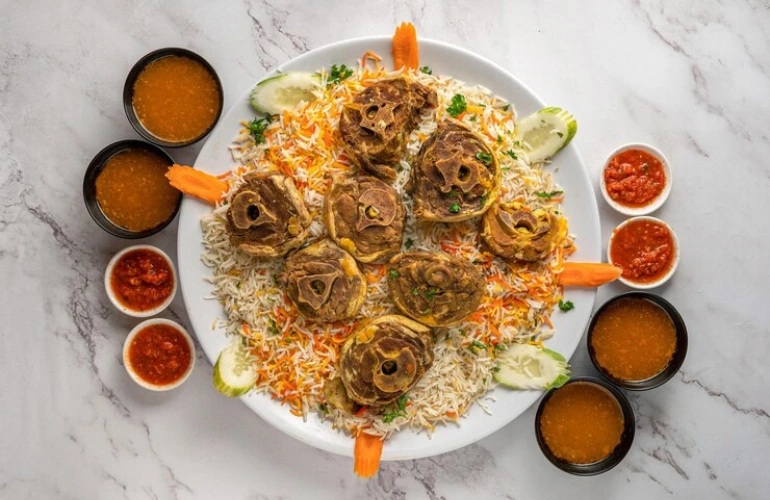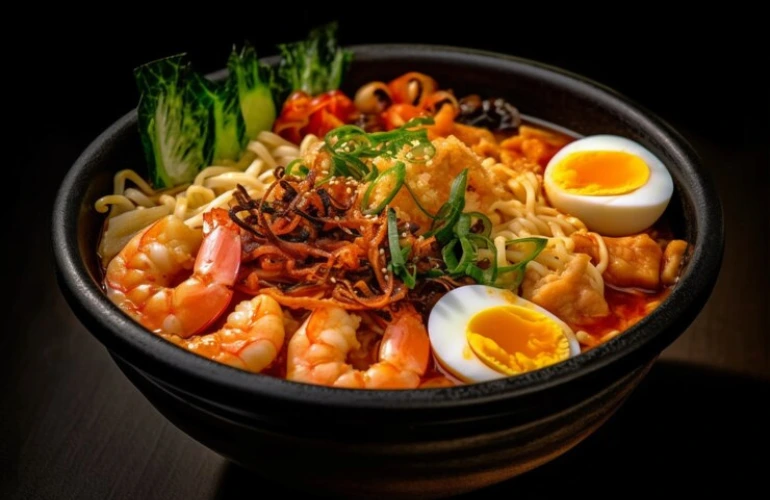Yemeni cuisine is one of the tastiest cuisines in the world that happens to be very indicative of the country’s rich history and cultural heritage. This cuisine has bold flavors and unique ingredients since it has a lot of variations that are both delicious and satisfying for the palate. We will try to unravel some of the most important elements of Yemeni food such as their traditional dishes, primary ingredients, cooking methods, and cultural significance.
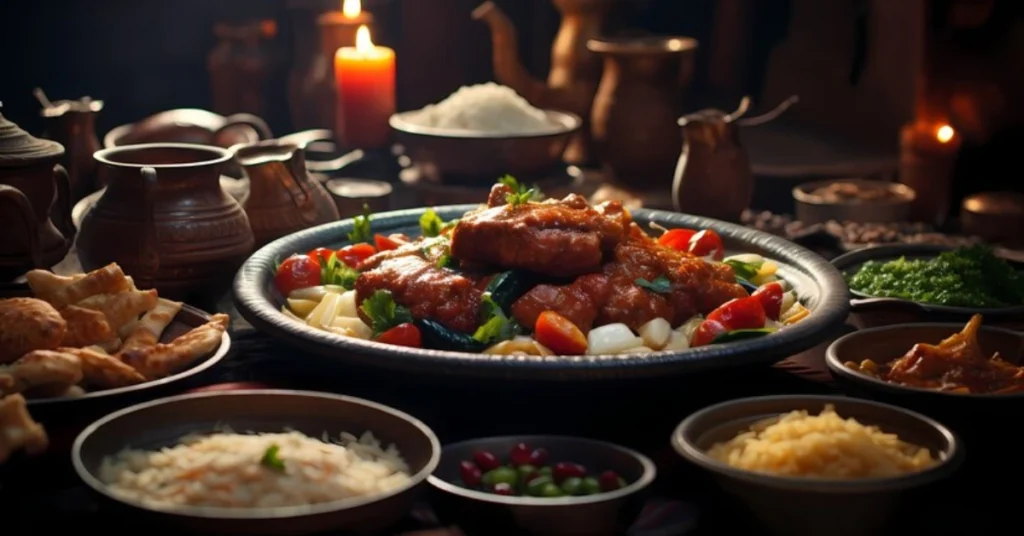
Understanding the Essence of Yemeni Cuisine
Yemeni cuisine is characterized by much spice and herb, as well as fresh ingredients, because this is a blend of several cultures, given its strategic position along ancient routes of trade. In turn, Yemeni dishes mix flavors from Africa, India, and the Middle East. Most traditional meals are nourishing, relying on staple dishes, such as rice, meat, vegetables, and flatbreads. . For more insights into Yemeni culture and traditions, click here.
Common Ingredients for Yemeni Cuisines
Foundations of Yemeni cuisine: the core ingredients. Spices Yemenis significantly depend on spices for seasoning food. Some of the most common spice they employ include:
Cumin
Coriander
Turmeric
Cardamom
Herbs Using fresh herbs like cilantro and mint adds freshness to a Yemeni dish.
Meat: it includes meat portions. These are typically parts of small antelope, chicken, and beef.
Legumes: Beans and lentils are added to stews and salads.
Grains: Rice is the most staple product of Yemen, taken with different meat courses.
All these ingredients blend up into a delicious food that can be very fulfilling.
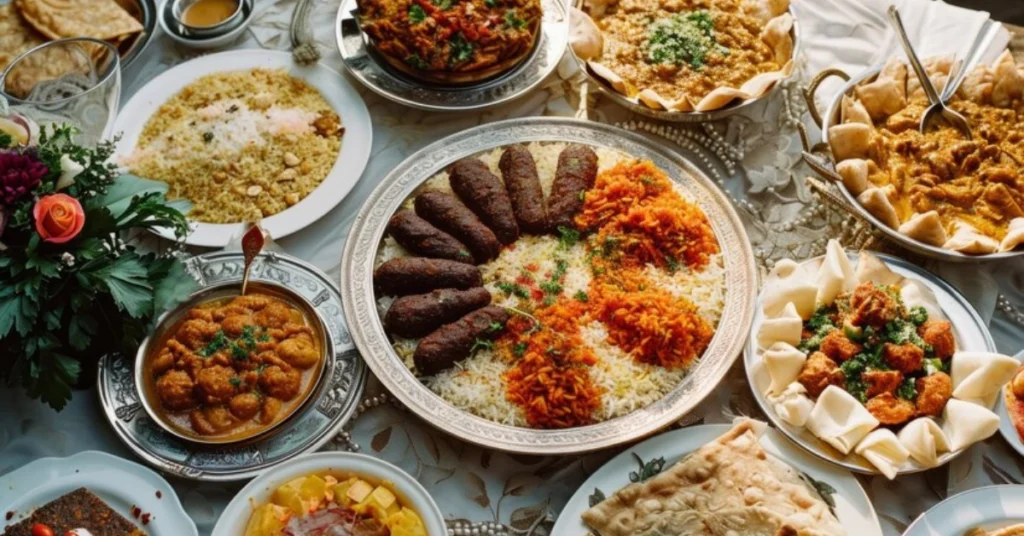
Most Popular Traditional Dishes to Try
On trying Yemeni food, some of the top dishes include:
Mandi: Rice filled with the aroma of marinated meat-cooked and served over saffron-infused rice- usually chicken or lamb. Mandi is made very often for special occasions and get-togethers.
Salta: This can be considered Yemen’s national dish, as it refers to a rich stew of roasted meat and vegetables, generally lamb, although various types exist. Traditionally, the flatbread is used for dipping.
Fahsa: Shredded meat in spices cooked over and served in a well-flavored sauce. It is usually eaten with bread to soak up the flavors of the broth.
Bint al-Sahn: Similar to Birk, but sweet, usually made with layers of dough alternated soaked in honey and covered with nuts. It is quite popular at celebrations in Yemen.
Luqaimat: These are sweet dumplings made of flour and yeast, fried until golden brown then covered with honey or syrup. They constitute a high class snack or dessert.
Each of these dishes gives an epitome of the flavors and preparation styles characteristic of Yemeni cuisine.
Bread in Yemeni Diet
Bread is at an odd place in Yemen food culture. Several varieties of bread are eaten on daily bases as complementary meals. Lahoh is a simple form of bread, spongy, that can be used to scoop stews or served with honey as a breakfast meal. Saluf is the other common kind of bread that primarily goes with savory dishes.
Bread in Yemen is not only for eating but hostship, communal bonding, and sociability; sharing bread during meals is the key event that holds family members and friends.
Tandoor techniques of cooking are among those Yemeni foods use to flavor up the dishes.
Tandoor techniques mainly include:
When cooking food, people use tandoors, which are made from clay, to bake or cook foods covered in coals. These methods provide a kind of smoky flavor to the food.
Slow Stewing: The majority of Yemeni dishes are prepared using slow cooking methods where flavors blend beautifully together.
An excellent example is how Yemenis make their own spice blends, often called Hawaij. Every region has its own recipe, but it generally creates a mixture of spices, cumin, and coriander.
These two techniques give Yemeni food such depth of flavor.
Cultural Significance of Yemeni Food
Food is an integral part of Yemeni life. Eating is a family affair or an act of entertaining guests for good hospitality. Traditionally, there is abundance in food as this will symbolize and represent the host’s generosity and goodness.
Other dishes too come with cultural values at other ceremonies. Mandi is usually prepared at special ceremonies as it is usually consumable on special occasions.
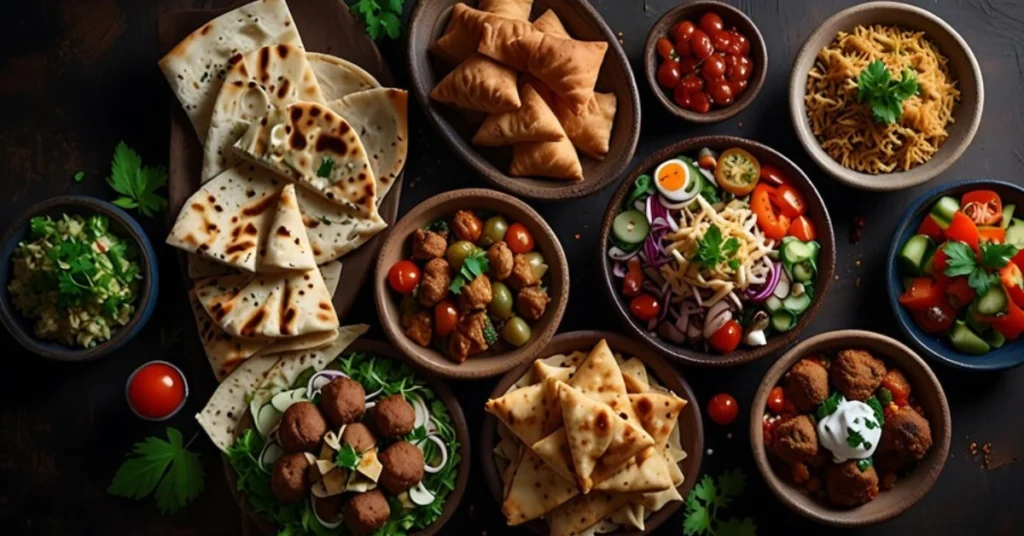
Frequently Asked Questions About Yemeni Food
Qno1:What is so special about Yemeni food?
Yemeni food is unique due to the spices from other cultures, when blended with native ingredients, have given so much flavor and richness.
Qno2: Is Yemeni food spicy?
Only some dishes will have some spiciness as chili peppers are used, but most authentic Yemeni foods depend more on the aromatic spices than on the heat.
Qno3: Are Yemeni restaurants present outside of Yemen?
Yes! Many cities around the world have restaurants with special traditional dishes from Yemen. What should I try if I’ve never been to a Yemeni restaurant? Start with Mandi or Salta for a really true, authentic experience that really features the classic flavor profiles.
Qno4: Are there vegetarian options in Yemeni cuisine?
Oh yes! There are plenty of vegetarian dishes in Yemeni cuisine-in fact, a standard lentil soup or vegetable stew is as hearty as it is savory.
Conclusion: Enjoy the Flavors of Yemen
With all these choices, Yemeni food is very appetizing in so many ways; it has a rich flavor and a heavy sense of cultural history. From the big stew called Salta to the sweet dessert called Bint al-Sahn, each dish holds within it a story born from tradition and welcome. Tasting this unique cuisine fulfills your taste buds and opens your mind to Yemen’s rich history and culture.
Whether you dine at a local restaurant or try to make these dishes yourselves, opening your palate to Yemeni food can take you on an exciting culinary adventure full of warmth and flavor. So go ahead and gather your ingredients today and embark on your journey into the world of Yemeni cuisine!







